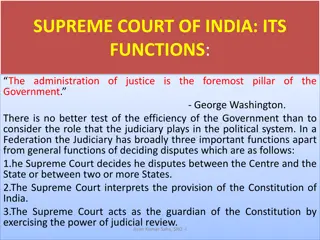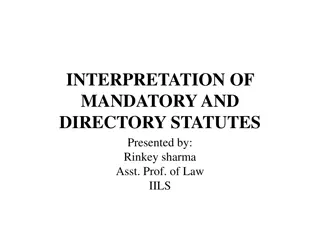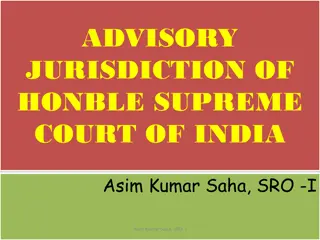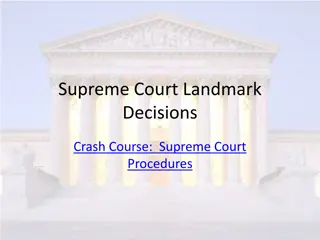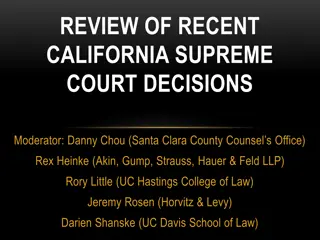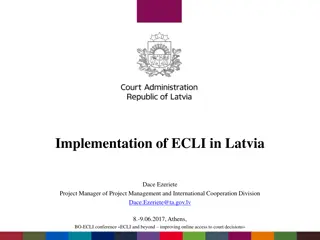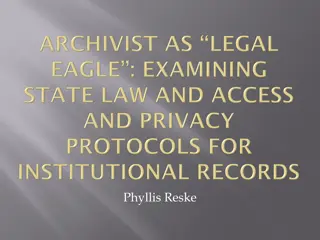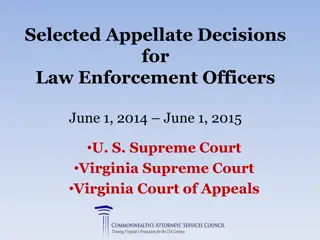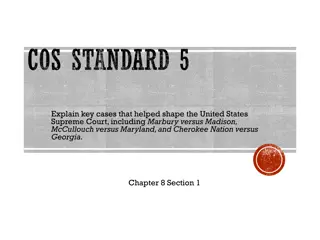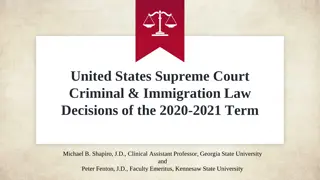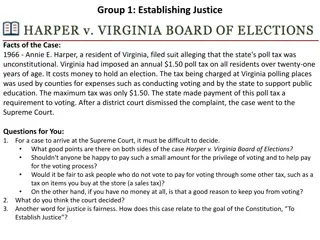Interpreting Taxing Statutes: Key Principles and Indian Supreme Court Decisions
Understanding taxing statutes is crucial to comprehend the imposition of taxes. This overview delves into the definition of taxing statutes, the general rules of interpretation, strict constructions, and key principles. The discussion also touches upon significant decisions by the Indian Supreme Court relating to the interpretation of fiscal statutes.
Download Presentation

Please find below an Image/Link to download the presentation.
The content on the website is provided AS IS for your information and personal use only. It may not be sold, licensed, or shared on other websites without obtaining consent from the author. Download presentation by click this link. If you encounter any issues during the download, it is possible that the publisher has removed the file from their server.
E N D
Presentation Transcript
INTERPRETATION OF TAXING STATUTES Presented by: Rinkey Sharma Asst. Prof. of Law. IILS
INTRODUCTION: First thing that we need to learn is, what is a taxing statute? By a taxing statute is meant anyAct making compulsory imposition of tax. Now, what is a tax? Any compulsory extraction of money by the Government amounts to imposition of tax which is not permissible except under the authority of a statutory provision. Though in a broader sense, a fee is also a tax . However, under the Indian Constitution, a fee and tax have different connotations. While a tax is imposed by the State for public purpose, a fee in contrast is imposed for rendering a service. The power to tax have been specifically distributed between the Union and the States under the lists in 7thschedule. Atax not mentioned in the list can be levied by the Centre by virtue of their residuary powers under Entry 97 of List I. Article 265-291 of the Indian Constitution contains general provisions relating to taxation in India. There are three stages in the imposition of a tax: i. Declaration of Liability of a person ii.Assessment of tax iii. Methods of recovery if the person taxed doesn t voluntarily pay.
GENERAL RULE: The general rule of interpretation of a taxing statute is that a subject of taxation cannot be taxed without the clear words for that purpose. The Acts of the Parliament must be read according to the natural construction of the words used therein. If the person sought to be taxed comes within the letters used in the law interpreted as aforesaid, he must be taxed. Otherwise he cannot be taxed, however hard it might be.
There is only strict construction of a taxing statute. The two well settled principles of interpretation, as applicable in taxing statutes are: 1. taxing enactments should be strictly construed and 2. the right to tax should be clearly established. One has to clearly look at what has been clearly stated in the statute. If there are two reasonable interpretations of taxing statutes, the one that favours the assessee has to be accepted. The recent case of Rajasthan Rajya Sahakari Spinning and Ginning Mills Federation Ltd v. Deputy CIT, Jaipur(2014) 11 SCC 672 is illustrative of this. The Income Tax Act, 1961 provided that losses arising out of the amalgamation of companies can be carried forward and can be set off against the profits of the amalgamated company. Now, though cooperative societies have a similar status in law as companies, in the aforesaid case it was held that such an advantage/benefit shall not be available to cooperative societies, though, equitably speaking, such a benefit should have been extended to cooperative societies as well.
INDIAN SUPREME COURTS DECISIONS: In A.V. Fernandez v. State of Kerala AIR 1957 SC 657, Bhagwati.J held that while construing a fiscal statute and determining liability of a person, one must have strict regard to the letter of the law. If the case strictly falls within the language of the statutes, the subject can be taxed, otherwise not. In Sales Tax Commissioner v. Modi Sugar Mills AIR 1961 SC 1047, in the words of Justice Shah, equitable considerations are entirely out of place in interpreting a taxing statute. In Martland Dairy and Farm v. Union of India AIR 1975 SC 1482, the sale of Milk Products like Chhena, Dahi, Butter and Cream in sealed containers were exempt from sales tax. There was no reason why sale in loose quantities and unsealed containers should be taxed and why those in seals won t be taxed. However, the Court, applying strict interpretation held that only sealed products will be exempt from sales tax.
In State of Uttar Pradesh v. Kores (India) Ltd. AIR 1977 SC 132, the interpretation of the term paper used in a notification issued under UP Sales Tax Act was under consideration. It was held that the term must be given its natural and ordinary meaning, i.e. that is used for writing, printing or packaging purposes. Hence, carbon paper was held not to be a paper within the meaning of the notification. In Ramavatar v. Commissioner AIR 1961 SC 1325, a case we have studied under literal rule, applying the natural and ordinary meaning of the term vegetable , it was held that betel leaves are not vegetables. Assistant Sales Tax
EXCEPTIONS TO THE RULE RELATING TO STRICT INTERPRETATION: Double Taxation: If any statute imposes double taxation upon a person, a construction which leans towards avoidance of double taxation is generally preferred. The principle was laid down in the case of IRC v. F.S. Securities(1964) 2 All ER 691 (HL) But as this is merely a rule of interpretation, it ceases to have any Legislature expressly enacts a law which permits double taxation. application when the
Computing Section and Charging Section to be read together: The Charging section and the computing section of a taxing statute together constitute an integral code and hence if a computing section is not available in a case, it must be held that such a thing was not meant to be charged. In National Mineral Development Corporation v. State of M.P AIR 2004 SC 2463, Justice Lahoti held that though the charging section and the computing sections may be found at different parts of the same statute or in different statutes, they have to be read together.
Taxing Statute to be interpreted in light of context: Purposive Interpretation preferred: Taxing statutes have been interpreted having reference to the context, object and purpose of theAct as is done in case of other statutes. In Administrator, Municipal Corporation, Bilaspur v. Dattatreya Dhankar AIR 1992 SC 1846 it has been held by the Supreme Court that while interpreting a taxing statute , the object of the legislature must also be kept in the mind and any ambiguity must be resolved in light of the object. In Indian Farmers Fertilisers Cooperative Ltd. V. Collector, Central Excise AIR 1996SC 2542, the government had exempted the use of raw naptha in manufacturing ammonia, provided the ammonia was used to make fertilisers. The Supreme Court held that the exemption was available whether raw naptha was directly used or used in water treatment, steam generation etc. while manufacturing ammonia.
Public Policy Considerations: In Maddi Venkataraman & Co Pvt. Ltd. V. Commissioner of Income Tax AIR 1998 SC 563, the Supreme Court held that the considerations of public policy are important in interpretation of taxing statutes








